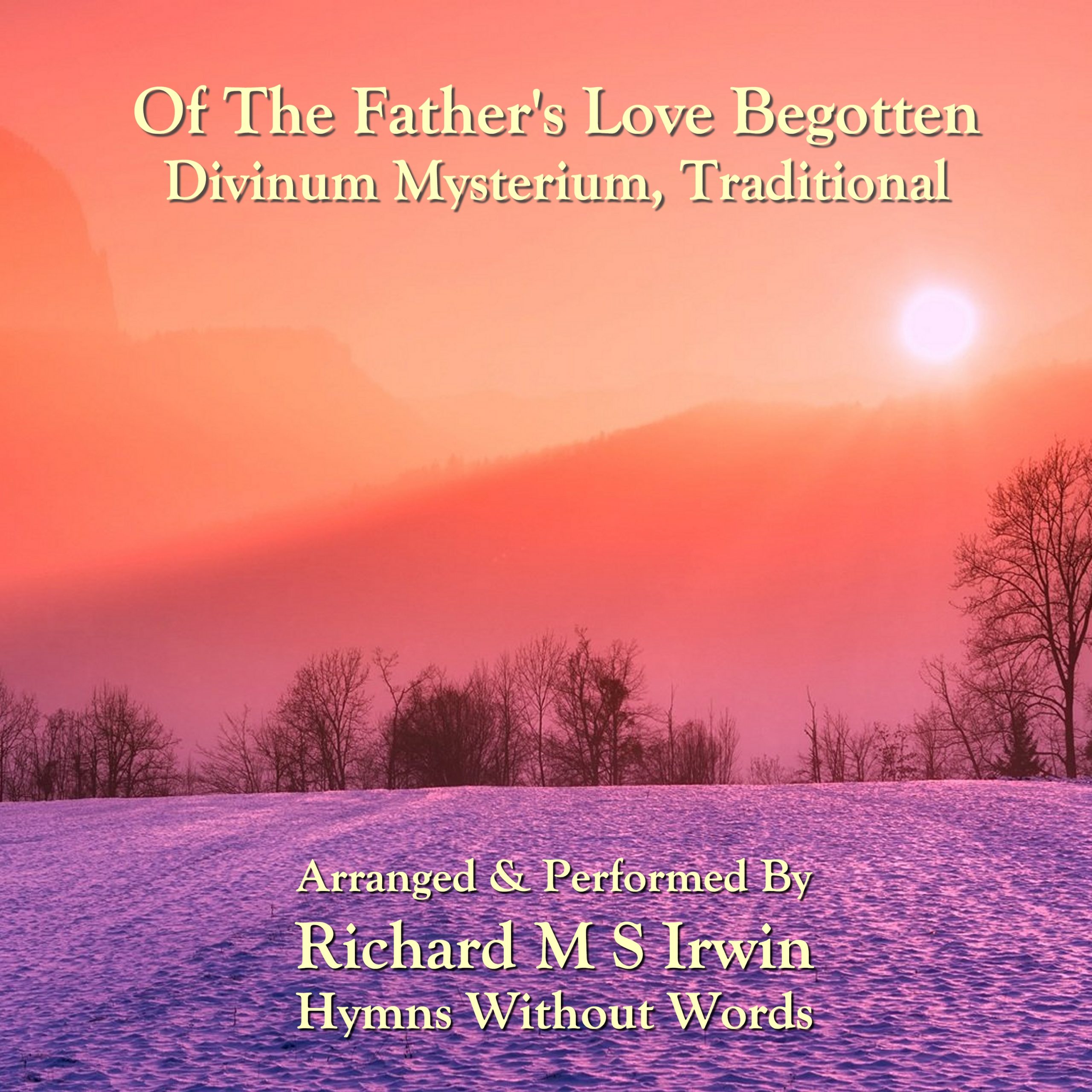Of The Father’s Love Begotten : Recording
- Tune: Divinum Mysterium, by an anonymous 13th Century composer of Plainsong. Original arranger, Theodoricus Petrus published in Piae Cantiones (1582).
- This arrangement and Performance ℗ 2021 Richard Irwin Music®. All rights reserved.
Of The Father’s Love Begotten : Free MP3 Download
The music used in this recording belongs in the Public Domain, but the Performance rights belong to Richard Irwin Music®. Please contact us if you wish to use the recordings other than for use in divine worship or for personal use.
This website is free to use, but not to operate. If you use our free MP3 hymns, please consider a donation to help keep this service free. Many thanks.
To keep up to date with the latest recordings, add your email address to our newsletter list.
Please also follow us on Amazon Music, Apple Music, Tidal, Spotify, SoundCloud, Twitter, YouTube, Facebook and Instagram.
5 Verse Recording
6 Verse Recording
Of The Father’s Love Begotten : Lyrics
1. Of the Father’s love begotten,
Ere the worlds began to be,
He is Alpha and Omega,
He the Source, the Ending He,
Of the things that are, that have been,
And that future years shall see,
Evermore and evermore.
2. At His Word the worlds were framèd;
He commanded; it was done:
Heaven and earth and depths of ocean
In their threefold order one;
All that grows beneath the shining
Of the moon and burning sun,
Evermore and evermore!
3. Oh, that birth forever blessed,
When the Virgin, full of grace,
By the Holy Ghost conceiving,
Bore the Saviour of our race,
And the Babe, the world’s Redeemer,
First revealed His sacred face,
Evermore and evermore.
4*. This is he whom seers in old time
chanted of with one accord,
whom the voices of the prophets
promised in their faithful word.
Now he shines, the long-expected.
Let creation praise its Lord,
evermore and evermore!
4/5. O ye heights of heaven, adore Him;
Angel hosts, His praises sing;
Pow’rs, dominions, bow before Him
And extol our God and King.
Let no tongue on earth be silent,
Every voice in concert ring,
Evermore and evermore.
5/6. Christ, to Thee with God the Father,
And, O Holy Ghost, to Thee,
Hymn and chant with high thanksgiving,
And unwearied praises be:
Honour, glory, and dominion,
And eternal victory,
Evermore and evermore!
4* Omitted in most hymnals.
- Original lyricist, Aurelius Clemens Prudentius (348-413), translated by John Mason Neale (1818-1866). Public Domain.
- Meter: 87 87 87 7.
Score
Available from MobileHymns.org
Latin Original
Corde natus ex parentis
Ante mundi exordium
A et O cognominatus,
ipse fons et clausula
Omnium quae sunt, fuerunt,
quaeque post futura sunt.
Saeculorum saeculis.
Ipse iussit et creata,
dixit ipse et facta sunt,
Terra, caelum, fossa ponti,
trina rerum machina,
Quaeque in his vigent sub alto
solis et lunae globo.
Saeculorum saeculis.
Corporis formam caduci,
membra morti obnoxia
Induit, ne gens periret
primoplasti ex germine,
Merserat quem lex profundo
noxialis tartaro.
Saeculorum saeculis.
O beatus ortus ille,
virgo cum puerpera
Edidit nostram salutem,
feta Sancto Spiritu,
Et puer redemptor orbis
os sacratum protulit.
Saeculorum saeculis.
Psallat altitudo caeli,
psallite omnes angeli,
Quidquid est virtutis usquam
psallat in laudem Dei,
Nulla linguarum silescat,
vox et omnis consonet.
Saeculorum saeculis.
Ecce, quem vates vetustis
concinebant saeculis,
Quem prophetarum fideles
paginae spoponderant,
Emicat promissus olim;
cuncta conlaudent eum.
Saeculorum saeculis.
Macte iudex mortuorum,
macte rex viventium,
Dexter in Parentis arce
qui cluis virtutibus,
Omnium venturus inde
iustus ultor criminum.
Saeculorum saeculis.
Te senes et te iuventus,
parvulorum te chorus,
Turba matrum, virginumque,
simplices puellulae,
Voce concordes pudicis
perstrepant concentibus.
Saeculorum saeculis.
History
In 325 AD, the Emperor Constantine called together the First Council of Nicea to end the controversy regarding the issue of the divine nature of God the Son and his relationship to God the Father. The council rejected the teachings of Arius, who believed that Jesus was not of the same nature as God the Father. One of the projects undertaken by the Council was the creation of a Creed, a declaration and summary of the Christian faith. The Nicene Creed was the result, a statement of faith that God the Father, God the Son, and God the Spirit are all of the same nature, three and yet one.
Prudentius’ hymn, “Of the Father’s Love Begotten,” confirms this belief in the Trinity in the very first line. He makes it clear in his lyrics that Christ is both human and divine “begotten” of God and of the very same substance.
Divinum mysterium is a plainsong melody probably dating from the 13th Century. The tune was published by Theodoricus Petrus and in Piae Cantiones (1582).
